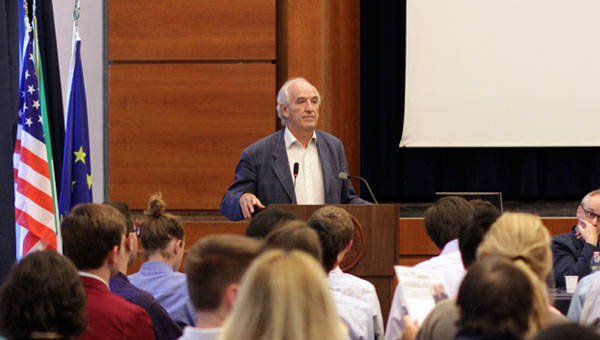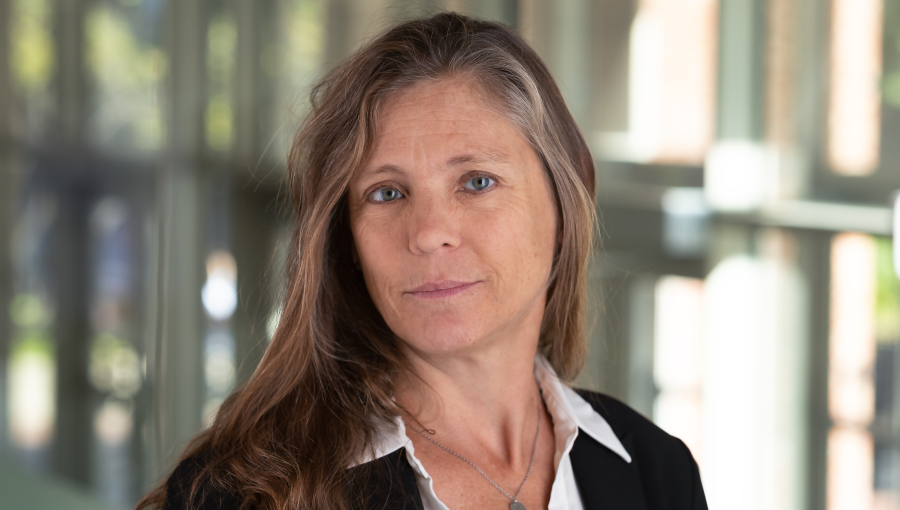Political Ethics in Contemporary Democracies - Professor Federigo Argentieri
Federigo Argentieri is Adjunct Associate Professor of Political Science and Director of the Guarini Institute for Public Affairs. A member of JCU’s faculty for over 20 years, Professor Argentieri teaches courses on international security and comparative politics of Europe, Latin America and developing countries. He regularly contributes to one of Italy’s main daily newspaper, Corriere della Sera, and to other Italian and international media.
Tell us about yourself.
I was born in Rome and at age 2 moved to Luxemburg because my father won a position at the European Parliamentary Assembly, the antecedent of the European Parliament. Three years later we moved to Brussels. My parents wanted us to be fluent in English in a predominantly francophone Europe, so we had a British nanny until middle school, when English became part of the school curriculum.
Having spent my childhood and part of my teenage years in Brussels, I naturally grew interested in “the other side” of Europe. I remember distant echoes of the Hungarian Revolution in 1956, the construction of the Berlin Wall in 1961 and the Prague Spring of 1968. By the time we returned to Italy I was ready to give substance to those interests and undertook a systematic study of the region at the University of Rome “La Sapienza.”
Right before graduating, I was offered an opportunity to live in Hungary. There, I started learning the language and began investigating the 1956 revolution, even though it still was a taboo. I graduated with a thesis on this topic and found a job at the Istituto Gramsci, a political research institute. I then moved to a think tank close to the Italian Ministry of Foreign Affairs called CeSPI, where I was given the East European desk. From there I got to follow the spectacular collapse of the USSR and its system in 1991.
By the mid 1990’s I was ready for another experience: I was given the opportunity to start teaching at JCU.
Why did you choose to focus on Hungary and Ukraine in your studies (and Central-Eastern Europe in general)?
My Hungarian connection was capped by a doctoral degree awarded by the University of Budapest- ELTE. Due to Hungary’s lengthy transition from the Soviet to the Western academic system, it happened quite late and coincided with the country’s entrance into the EU. My father accompanied me to the ceremony, also in order to savor the triumph of his pro-Europe ideals.
Regarding Ukraine, in 1986 I came across a book by Robert Conquest, possibly the most authoritative expert ever on the USSR, about the Ukrainian famine of 1932-33. I grew interested in the total secrecy surrounding that tragic event. When Ukraine became independent in 1991, it was also thanks to the revelation of that national catastrophe, which Conquest’s book had so eloquently revealed. In order to give more substance to this new interest, I became a student again and attended the Harvard Ukrainian Summer Institute: seven weeks, 23 hours of class per week, huge daily assignments, 12 credits. Truly a full immersion.
All subsequent developments have confirmed Ukraine’s crucial strategic position and its difficult relationship with Russia. This increased my interest to further study this tormented land, endowed with a beautiful language, breathtaking landscapes, wonderful people, and a very tragic history.
What is your teaching philosophy?
My take is that you can spark political science students’ interest in two ways: through mechanisms and events, including their background, illustrated by very visible and concrete examples. I value quantitative methods and empirical research a lot, yet my approach tends to focus mostly on the “how, what, why” of politics, and more marginally on the “who, when” which students have greater difficulty grasping. Everybody can detect that I have more of a research than a purely teaching background, and I think it is an advantage.
More in general, my inspiration derives from trying to make politics and ethics, which Machiavelli discovered as being distinct and separate, come a bit closer together. I try to pass this message on to the young, who are very receptive to it. As the late Czech president and former dissident Václav Havel once said, the only hope we have consists of young people feeling all the problems of this world as their own.
What is your view on the rise of populism in Europe? What are the biggest challenges that the European Union is facing?
The world seems to have entered a new phase after the huge globalization wave of the past quarter century. Countries where the majority of people believe they have suffered great wrongs and disadvantages from globalization vote populist leaders into office. Leaders who pursue autarchic and self-centered policies that could endanger world peace.
But I believe that the greatest problem Europe is facing is the following: are we witnessing a war of religion or is Islamist extremism only a distorted and pathological expression of a substantially peaceful religion and culture? Or, to put it differently: can Islam be reformed and made to coexist with democracy and human rights, as happened with other religions? I firmly believe it can, but the process requires much time and endurance.
Can Europe survive the challenge? Populism and Islamist extremism/terrorism are two aspects of the same problem, they lead to a clash of civilizations that would be disastrous. Europe must adopt a more coherent and regulated immigration and integration policy to avoid it. Yet I can only answer this question completely after the French, German and Italian elections scheduled for the next few months. I definitely believe that Brexit will be sorely regretted not only by those who voted to stay, but also by those who voted in favor: the UK risks to fall apart if Scotland quits and Ireland reunifies.
The EU should also work to better present itself and contrast its reputation of bureaucratic tyranny and non-accountability: the recent 60th anniversary spirit seems to have understood this problem. In light of my family story, but not only, I strongly believe that this is a great endeavor which has more storms ahead of it, but eventually brighter skies.
What is your take on the Italian political landscape in the coming years?
I think former Prime Minister Renzi made a mistake in 2014-15 when he did not secure an alliance with Berlusconi on constitutional and electoral reforms. I still believe that the PD (Partito Democratico) and Forza Italia (Berlusconi’s party) should stand together against the other parties, as they represent the least unacceptable solution. That being said, I do not reject everything that comes from the Five Star Movement, and admit to having voted for Virginia Raggi in the Rome mayoral elections in 2015, with no enormous regrets (yet). But I would never want any of the Five Star people in the Prime Minister’s office, the Ministry of Foreign Affairs or directing the national economy.
I still hope Italy will be able to achieve a “normal” political system before too long: one with conservative and progressive coalitions alternating in office, instead of the current almost incomprehensible mess. The defeat of the December 4 referendum on constitutional reform certainly dealt a blow to this hope, which is now quite feeble.
Name one challenge you encountered in your teaching career and how you were able to overcome it.
At the beginning of my career, I tended to supply excessive information to the students because I assumed they had more of a background, and this led to some short circuits. Also, I worked on my tone of voice which at times was a bit dull and boring, and developed “anti-doze off” techniques. It is also always important to maintain eye contact and to avoid reading from notes, which is what I try to do. Luckily I have a good memory, which I will try maintain for as long as possible with vitamin C!
When so many liberal arts colleges in the US why should one come to JCU?
Because JCU offers a wonderful diversity, a respectful and tolerant environment, great academics and much more at reasonable costs. My oldest students are on their way to reaching middle age (alas for me) and their memories of the Alma Mater, together with their lifelong friendships with one another, speak volumes.
What is the biggest challenge of directing the Guarini Institute? What is the biggest reward?
Biggest challenge: frequent turnover of student interns, with little time to give them basic instructions. Yet the vast majority of them have proven to be excellent. Biggest reward: several very illustrious speakers that we invited have become very fond of us and have decisively contributed to a virtuous circle for our reputation. The Institute is highly respected and increasingly well known in many parts of the world.
How does it feel having been part of the JCU’s community for so long?
People whom I have known for a long time, especially alumni and staff, sometimes call me “an institution” of JCU. Despite my sometimes ironic reactions (“Ok, like a building or a piece of furniture, right?” is the most frequent) I am pleased by it. And at the risk of sounding immodest, I also like it when my scholarship and my appearances in the media are immediately associated with JCU and the Guarini Institute, almost without me needing to specify. One of the things I hope will happen in my afterlife is meeting with John Cabot and telling him about it.






